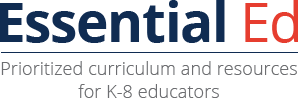Narrative Texts
Unit description: Students will interpret, analyze, and evaluate narrative structures and techniques and their impact on a text(s). Students will analyze and interpret themes and motifs across and within texts to determine their effectiveness within the narrative form. Students will utilize this analysis to write a narrative that includes a clear structure and appropriate use of various narrative techniques.
Essential Outcomes
Reading
- 8R1: Cite textual evidence to strongly support an analysis of what the text says explicitly/implicitly and make logical inferences.
- 8R2: Determine one or more themes or central ideas of a text and analyze their development over the course of the text; summarize a text.
- 8R3: In literary texts, analyze how particular lines of dialogue or events propel the action, reveal aspects of a character, or provoke a decision. In informational texts, analyze how individuals, events, and ideas are introduced, relate to each other, and are developed.
- 8R6: In literary texts, analyze how the differences between the point of view, perspectives of the characters, the audience, or reader create effects such as mood and tone. In informational texts, analyze how the author addresses conflicting evidence or viewpoints.
Language
- 8L3: Use knowledge of language and its conventions when writing, speaking, reading, or listening.
- 8L5: Demonstrate understanding of figurative language, word relationships, and nuances in word meanings.
- 8L6: Acquire and accurately use general academic and content-specific words and phrases; apply vocabulary knowledge when considering a word or phrase important to comprehension or expression.
Writing
- 8W3: Write narratives to develop real or imagined experiences or events using effective techniques, relevant descriptive details and clear sequencing.
Speaking and Listening
- n/a
All Standards Addressed in this Unit
- R1, R2, R3, R4, R5, R6, 8R7
- L3, L4, L5, L6,
- W3,
- SL1, SL4, SL6
Essential Questions and Big Ideas
- How do authors use narrative strategies and techniques to explore universal questions and/or convey a message?
- Authors use narrative techniques to enhance their writing
- Characterization impacts a narrative in terms of plot arch, theme, events, and experiences.
- Good readers look at the impact of narrative techniques and story elements to determine how they explore topics and issues
- How do readers evaluate the effectiveness of a story or text?
- Good readers use a created or established criteria for evaluating the effectiveness of a story or text
- There are multiple ways to evaluate a text, and multiple purposes for doing so
- How do I create my own narrative?
- Good writers appropriate techniques and styles to craft their own writing
- Playing with techniques allows good writers to craft their own style
- Utilizing literary techniques and developing a clear theme through a sequence of events can produce a quality narrative
Prerequisite Skills
- Engage effectively in a range of collaborative discussions with diverse partners; express ideas clearly and persuasively, and build on those of others.
- Cite textual evidence to support an analysis of what the text says explicitly/implicitly and make logical inferences.
- Determine a theme or central idea of a text and analyze its development over the course of the text; summarize a text.
- Draw evidence from literary or informational texts to respond and support analysis, reflection, and research
- Write narratives to develop real or imagined experiences or events using effective techniques, descriptive details and clear sequencing.
Download the complete Grade 8 ELA Unit 2 framework to customize for your own planning.

